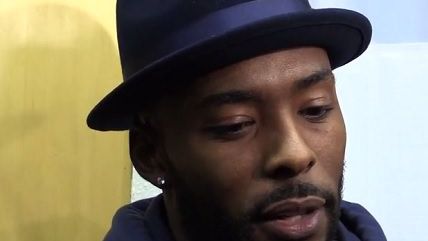The Authoritarian Response to Andrew Hawkins's Call for Justice
Obey this

Last Sunday, Cleveland Browns wide receiver Andrew Hawkins drew national attention for wearing a shirt with the words "Justice for Tamir Rice and John Crawford" printed on it. Hawkins's shirt referred to two recent shootings by police in Ohio. Tamir Rice was a 12-year-old child who was killed by police despite the fact that a 911 caller said the gun Rice had was probably fake (the caller was right—it was a toy pellet gun). John Crawford was a 22-year-old man who was walking with a BB rifle in the toy gun aisle of a Wal-Mart when he was shot and killed by police.
There are reasons to be concerned about the legitimacy of police actions in each case. Video footage showed Crawford did not point the BB gun at police and also raises questions about police claims that they only shot Crawford after he ignored their repeated demands that he drop the gun (the video suggests police may have shot Crawford immediately, without waiting for a response). Similarly, after the Rice shooting, police claimed that they believed the 12 year old was a threat to bystanders and ignored their demands that he raise his hands, but video footage raises questions about both claims.
None of this means the police officers who shot Rice and Crawford are lying, much less that they are guilty beyond a reasonable doubt. That's what trials are for (as the Rice family has suggested). Officers might well have a convincing way to answer the questions raised by video footage in each case. But Hawkins wasn't calling for summary action against the police. His shirt asked for "justice"—which suggests simply that the criminal justice system investigate the shootings and that authorities take action through prosecution if warranted.
It is not surprising that police officers and those who represent them would disagree with Hawkins—just as it is his right to call for justice, it is their right to defend themselves publicly. But a Cleveland police union official went further. Patrolman Union president Jeffrey Follmer demanded an apology from the Browns and then went on cable television to declare that the best way for people to avoid being shot by police is to "[l]isten to police officers' commands. Listen to what we tell you, and just stop…I think that eliminates a lot of problems."
That may be good advice for people living in an authoritarian state, but it does not sit well with a constitutional democracy. Moreover, it's not very good legal advice. Just because a police officer says something doesn't always mean you must obey. For instance, police officers often conduct "consent" searches—meaning that they ask for permission to conduct a search of someone's possessions when they don't have independent legal grounds to conduct a search (which would typically, though not always, require a warrant). If people took Follmer's advice to obey, they'd give away their constitutional right to say no in some circumstances. Even if Follmer's advice was meant to be limited to the very specific context where a police officer tells someone with a gun (or who they suspect to have a gun) to follow their command, obeying their commands doesn't always ensure a good result, as Levar Jones found out when a police officer shot him while Jones was trying to retrieve his driver's license from his car. (Michael Eric Dyson pointed to the Jones case as well when discussing Follmer's admonition on MSNBC).
Police officers, like the rest of us, aren't always right. They deserve respect and appreciation when they do their jobs well, and people ought to respect and follow their lawful orders. Certainly, there are limits on how civilians can interact with the police—just as there are limits on how the police can interact with civilians (as Sen. Rand Paul, for one, has suggested). But we don't live in a society where citizens are required to submissively obey the police in all circumstances. Andrew Hawkins has the right to call for justice in the Rice and Crawford cases—which does not mean that a specific result is preordained. Jeffrey Follmer is the one who needs to apologize for attempting to intimidate Hawkins and the rest of us into overly deferring to authority.


Show Comments (51)